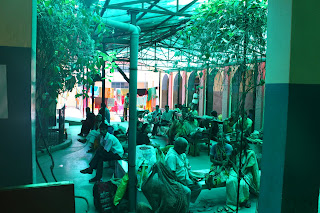We made it to Mumbai for about 12 hours. From what I could tell, it was glorious. There was
a Coffee Bean in the airport. There were restaurants, shops, people milling about at coffee
shops, and swanky bars (with drinks other than the nonalcoholic “mocktails”). The streets
were relatively clean. Honking was somewhat suppressed. I even saw a French Connection.
The beach was white-ish, air was fresh(er), and people were speed walking on a sidewalk
(yes, they had sidewalks!) with spankin’ white sneaks and workout gear. Youngsters wore
skinny jeans and tank tops, and spoke English to each other. It was a bit of a culture shock
after Bihar. But I’m not going to lie – it was a much needed stopover. I only wish we had
more time there...




















































